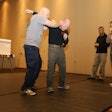Appleton, Wis., has long been a city of innovation. It lays claim to the second-oldest co-educational college in the nation (Lawrence University, established in 1847), the first electric streetcar system in the United States (1885), first American hydroelectric central plant (1882), and the first U.S. school built exclusively for vocational education (1912).
Today, Appleton is still on the cutting edge-thanks in part to innovative policing programs that have led some to call its modestly sized police department one of the most progressive law enforcement agencies in the nation.
"Appleton was practicing community policing long before it became the rage in police work," says Lt. Greg Goodavish, a 20-year policing veteran who coordinates the department's Sensitive Crime Investigations Unit. "They were doing it when I came here in '85, and were doing it well before that.... Appleton had a very good reputation for always looking for a new and better way of doing things."
It still does. While some departments are still wrestling with community policing concepts, Police Chief Richard W. Myers, a nationally recognized advocate of pushing the envelope on policing practices, is already talking about next-generation police work: Neighborhood Driven Policing. As the name implies, Neighborhood Driven Policing means that officers empower neighborhood representatives to take a direct role in identifying community problems and directing crime-prevention strategies.
"I like to describe community-oriented problem solving as an evolution, not a revolution," Myers says. "The whole trend is trying to engage citizens with policing their own community."
Appleton, one of 14 interconnected towns along the Fox River-Lake Winnebago waterway, is a traditional small Wisconsin community: schools are top-notch, lawns are well kept, most residents are of European descent, and Octoberfest is celebrated with great abandon. But the city is also facing the less idyllic realities of lean city budgets, social and economic stresses created by rapid growth, and crimes committed by, and against, young people.
The Appleton PD has received national attention for innovations in victim- and social-services-oriented sexual assault investigations, intercultural outreach to ensure services are fairly and effectively distributed to minority communities, and, most notably, programs that address the real-life needs of its youngest residents.
The Police School Liaison Program, which places officers in each of the city's public schools, creates a framework for mentoring programs, and coordinates individualized truancy and runaway assessments with local social-service agencies like the Boys and Girls Club.
"We'd rather identify those kids needing intervention, and have an officer coordinating that intervention (in kindergarten and first grade) than have more officers on the streets chasing them around when they're in high school," Myers notes.
Modeled after a pioneering program at Milwaukee's Children's Hospital of Wisconsin (CHW), the center is based at CHW-Fox Valley, and serves three neighboring counties. It coordinates medical, law-enforcement, social service and legal services in an efficient and child-friendly program. Staff can provide medical assessment and treatment, case review services, expert court testimony, specialized forensic interviewing and videotaping services (so the child does not have to appear in court), and a network of agency referrals.
That dedication to children's welfare runs throughout the department, leading Myers to boast that the Appleton PD has "105 juvenile officers," with every officer on the force being committed to caring for and protecting Appleton's youth.
When the department realized that chronic runaway juvenile (RAJ) cases were siphoning away officers' time at the expense of non-chronic runaways-kids who run less than two times in a calendar year-it changed the way it handled RAJ cases. Officers are no longer dispatched to the field to take reports for chronic runaways; instead, reports are taken over the phone, or on a walk-in basis at the police station's front desk. The officer who takes the report checks back every 10 days to see if the situation has changed.
As a result, officers have time to undertake more intensive investigation of non-chronic runaway cases. Returned juveniles are interviewed to determine why they left, where they went, whether they committed or were victimized by crime while away, and what can be done to prevent them from running again.
Patrol officers are also empowered to independently "problem solve" while in the field. About nine years ago, Officer Mike Hammen recalls, he responded to a report of an elderly man who had fallen in the street. As Hammen talked with the man, he realized that the situation required more than a routine check welfare response.
"He was walking two miles to a Kentucky Fried Chicken because his homebound wife wanted chicken," Hammen says. "He was 90 years old, and was going to walk another mile. (He was physically fine) but he still needed chicken. So I put him in my car, and drove him to KFC. There was no reason I couldn't do that.... We got him his food and brought him home."
The most recent indication of local law enforcement's success: Earlier this year, Appleton appeared high on the Farmer's Insurance Group's annual list of the nation's Top 25 Most Secure Places to Live.
"It's not Mayberry," Myers notes. "But people still care in our community.... They care about the quality of their neighborhoods, and they look out for each other."
Bryn Bailer, a former newspaper reporter, is a contributing editor for Police. By day, she is a member of the Tucson (Ariz.) Police Department Communications Division.















